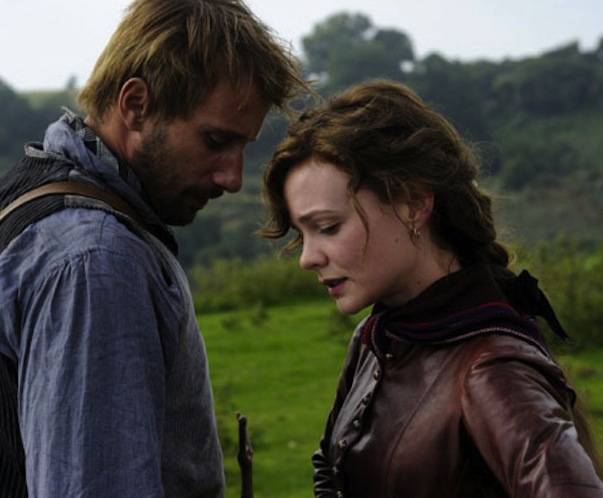Film Review: “Far from the Madding Crowd” — Made Sappy
Why did this version of Far from the Madding Crowd have to be so straight-laced and traditional, so bland and dull?
Far from the Madding Crowd, directed by Thomas Vinterberg. At Kendall Square Cinema, Coolidge Corner Theatre, AMC Loews Boston Common, and other screens around New England.

A scene from the latest version of “Far from the Madding Crowd.”
By Gerald Peary
Thomas Hardy’s fourth novel, Far from the Madding Crowd, changes its tone so often, from love story to rustic comedy to lurid gothic melodrama, that you must wait until the last pages to know if what you’re reading is a lighter work or a fatalist tragedy. Can I provide a spoiler for an 1874 novel and say that, unlike grim masterpieces like Tess of the D’Urbeville and Jude the Obscure, this Hardy has a happy ending? Farmer Gabriel Oak is rewarded with a wife for his unworldly patience and stoicism, lasting out Bathsheba Everdene’s more zealous suitors. He’s the tortoise crossing the finish line with the voluptuous brunette his prize at last. He’s adored her from the first chapter of the book, but it’s taken Bathsheba until the conclusion to grasp what the readers have known from the beginning, that this is her man.
Why is Bathsheba so blind? It’s Gabriel who has figured out her fatal flaw the initial time they meet, when she imperiously snubs him: “Vanity,” he proclaims. In most ways, she’s a bonafide pre-feminist heroine: self-assured, confident as the working owner of her farm, not intimidated at all bossing about her male employees, and not eager in any way to get married. But her delicious beauty causes all men to weaken before her, and clearly that’s made her an egotist. Her narcissism leads her to fire Gabriel twice because he has dared speak openly to her and a bit critically. As long as he is loyal and obedient, which is most of the book, Bathsheba doesn’t think romantically for even a minute about her underling. It’s only after years have passed, and she has suffered the comeuppance of a dreadful marriage to Sergeant York, that she can look down from on high and grasp the virtues of ever-virtuous Gabriel. He’s an Oak, indeed.
The new film adaptation of Far from the Madding Crowd begins with a mistake. The very first time Bathsheba (Carey Mulligan) sees Gabriel (Matthias Schoenarts) amidst his sheep, she checks him out. We watch him from her POV, and she obviously thinks he’s kind of cute. All through the movie they shoot each other the same kind of telling looks. So Hardy’s dramatic ending, Bathsheba’s astonishing about-face, has no power in the film. Bathsheba has dug Gabriel all along. Her vanity is gone in the movie, smoothed out, and so is her complexity. She’s simply a nice young woman. It’s totally out of character in the film when, following the plot of the novel, she banishes Gabriel from her sight.
Carey Mulligan, small-breasted and dimpled, is a bit miscast as the shapely knockout who is Bathsheba. Matthias Schoenarts is OK as Gabriel, though missing much of the figure’s inner strength. Tom Sturridge is an inadequate Frank Troy, lacking the flamboyant charisma of a cad who effortlessly charms women — even Bathsheba foolishly falls in love with him. And she marries him. The worst casting is Michael Sheen as Boldwood. He’s not as handsome as the character should be, nor does he even hint at the private craziness which infests Boldwood once he’s become smitten by Bathsheba. It makes sense in the novel when Boldwood, tight with concealed anger, picks up a rifle and shoots down Troy; the same act is unmotivated in the movie.
And so on and so on. What a rotten film! It’s really hard to fathom that Denmark’s Thomas Vinterberg, co-founder of the radical Dogme 95 Movement with Lars Van Trier, could direct a picture so straight-laced and traditional, so bland and dull. And so lazily edited: note the arbitrary cuts which take us from one scene to another. And oh that sappy music throughout, so un-Hardy like.
Gerald Peary is a professor at Suffolk University, Boston, curator of the Boston University Cinematheque, and the general editor of the “Conversations with Filmmakers” series from the University Press of Mississippi. A critic for the late Boston Phoenix, he is the author of 9 books on cinema, writer-director of the documentary For the Love of Movies: the Story of American Film Criticism, and a featured actor in the 2013 independent narrative Computer Chess.

I recently saw the 1967 version and found it really captivating, the cast were splendid and the DP work sumptuous. Hardy is a difficult beast to tame for the screen, although I am not a purist and happy for changes to be made but with this film having a mere 2 hour running time I wonder how much will be cut or altered. Plus I am not sold on the cast.